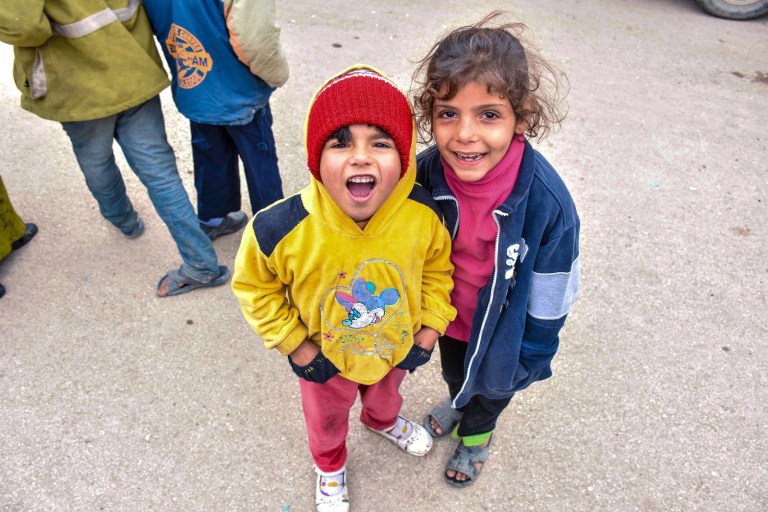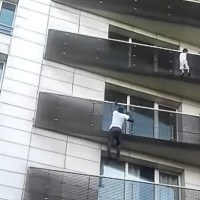He scaled five stories up the front of the building in mere seconds, pulling himself from balcony to balcony with sheer strength and adrenaline. Mamoudou Gassama was determined to rescue the little boy dangling from a fifth floor railing in Paris.
He didn’t know the boy—he just didn’t want him to get hurt. So while others crowded below shouted and pointed and called for help, Gassama started climbing.
Gassama is a 22-year-old undocumented refugee from Mali. He left his home country as a teenager and traveled through Burkina Faso and Nigeria before making the harrowing journey across the Mediterranean Sea. After a horrifically violent experience at the hands of law enforcement in Libya, he spent several years living legally in Italy before moving in with his brother in Paris less than a year ago.
He was on his way to a soccer game with his girlfriend when he heard the commotion and jumped in to help. The way he scaled the building and rescued the 4-year-old from injury or death earned him the nickname the “Spiderman of Paris.”
It also earned him legal residency in France, granted to him by the French president, and a job with the Paris fire department due to his heroic actions.
This story is remarkable for many reasons. There’s the unlikely hero bit. There’s the fact that the little boy’s dad was out playing Pokemon Go when his child fell out the window. And many have pointed out that while Gassama is rightly being celebrated for his heroism, it sets the bar impossibly high for other refugees and immigrants—they literally have to be superheros in order to be accepted.
But to me, the most striking part of this story is how after years of fighting for his life as a refugee, Gassama was still willing to risk it all for a stranger at a moment’s notice. He audaciously and extravagantly laid his life on the line to help someone else’s child. While others stood around lamenting the violence unfolding in front of them, Gassama went out on a literal ledge (several of them, in fact), to stop it.
It made me wonder: what we are willing to sacrifice to love others who are risk? What are we willing to sacrifice for people who are barely hanging on to their lives and their hope?
 Millions of refugee children across the Middle East and Europe are metaphorically hanging from the railing—constantly at risk of death, exposure, trafficking, abuse, hunger, and horrific trauma.
Millions of refugee children across the Middle East and Europe are metaphorically hanging from the railing—constantly at risk of death, exposure, trafficking, abuse, hunger, and horrific trauma.
What are we willing to sacrifice for them?
Hundreds of children (or more) are being separated from their parents, immigrants and asylum seekers, at the US-Mexico border and placed in detention centers, where they are vulnerable to violence, abuse, and trauma.
What are we willing to risk for them?
Will we sacrifice our tax dollars? Our sense of safety? Our power as majority—in race, religion, or background?
Are we willing to teach our children how to share their school with kids who speak different languages, celebrate different holidays, or eat different food?
Are we willing to lay our lives on the line? Would you risk dying for them?
Mamoudou Gassama was the only one in that entire crowd who was willing to risk it all to save a life. He climbed that building knowing full well he could fall to his death, or break a limb, end up in the hospital, and get deported.
Yet he chose to love that child anyway.
It wasn’t necessarily that other people in the crowd didn’t care as much as Gassama did—I’m sure they desperately wanted to help. It’s just that there are a lot of reasons not to help.
Many bystanders probably felt paralyzed or powerless. They either couldn’t think of how to help or they didn’t think they could help. (Though a lot of them probably could have if they’d tried—adrenaline is an amazing thing.)
But the fact remains that most of them weren’t willing to risk trying.
We’re not asking you to climb a building. But saving lives and choosing to love anyway requires sacrifice. Tangible, painful, inconvenient sacrifice. If it didn’t, we’d all be a lot more loving.
If we want to be the kind of people who love anyway, then this is our chance. Let’s figure out how to show up and save lives, regardless of what it may cost.

When asked why he started climbing that building, Gassama answered, “I like children, I would have hated to see him getting hurt in front of me. I ran and I looked for solutions to save him.”
“I didn’t think about it. I climbed up and God helped me.”
What if we responded that way when tragedy and crisis unfolded in front of us? Let’s learn from Mamoudou Gassma and choose not to overthink it…
We like children, and we would hate to see them get hurt. So how can we run toward them, start climbing, and let God help us from there?
Peacemaker Fridays are published weekly to share stories of people unmaking violence around the world. Be inspired. Take Action.


